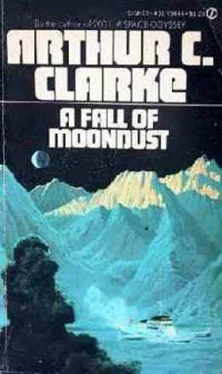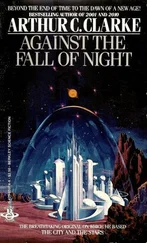Arthur Clarke - A Fall of Moondust
Здесь есть возможность читать онлайн «Arthur Clarke - A Fall of Moondust» весь текст электронной книги совершенно бесплатно (целиком полную версию без сокращений). В некоторых случаях можно слушать аудио, скачать через торрент в формате fb2 и присутствует краткое содержание. Жанр: Фантастика и фэнтези, на английском языке. Описание произведения, (предисловие) а так же отзывы посетителей доступны на портале библиотеки ЛибКат.
- Название:A Fall of Moondust
- Автор:
- Жанр:
- Год:неизвестен
- ISBN:нет данных
- Рейтинг книги:5 / 5. Голосов: 1
-
Избранное:Добавить в избранное
- Отзывы:
-
Ваша оценка:
- 100
- 1
- 2
- 3
- 4
- 5
A Fall of Moondust: краткое содержание, описание и аннотация
Предлагаем к чтению аннотацию, описание, краткое содержание или предисловие (зависит от того, что написал сам автор книги «A Fall of Moondust»). Если вы не нашли необходимую информацию о книге — напишите в комментариях, мы постараемся отыскать её.
A Fall of Moondust — читать онлайн бесплатно полную книгу (весь текст) целиком
Ниже представлен текст книги, разбитый по страницам. Система сохранения места последней прочитанной страницы, позволяет с удобством читать онлайн бесплатно книгу «A Fall of Moondust», без необходимости каждый раз заново искать на чём Вы остановились. Поставьте закладку, и сможете в любой момент перейти на страницу, на которой закончили чтение.
Интервал:
Закладка:
“Are you there, Pat?” he called. “I'm on the ladder.”
“Don't wait for me — I'm coming.”
That was easier said than done. It felt as if a million soft yet determined fingers were clutching at him, pulling him back into the rising flood. He gripped one of the seat-backs — now almost hidden beneath the dust — and pulled himself toward the beckoning light.
Something whipped against his face; instinctively, he reached out to push it aside, then realized that it was the end of the rope ladder. He hauled upon it with all his might, and slowly, reluctantly, the Sea of Thirst relaxed its grip upon him.
Before he entered the shaft, he had one last glimpse of the cabin. The whole of the rear was now submerged by that crawling tide of gray; it seemed unnatural, and doubly sinister, that it rose in such a geometrically perfect plane, without a single ripple to furrow its surface. A meter away — this was something Pat knew he would remember all his life, though he could not imagine why — a solitary paper cup was floating sedately on the rising tide, like a toy boat upon a peaceful lake. In a few minutes it would reach the ceiling and be overwhelmed, but for the moment it was still bravely defying the dust.
And so were the emergency lights; they would continue to burn for days, even when each one was encapsulated in utter darkness.
Now the dim-lit shaft was around him. He was climbing as quickly as his muscles would permit, but he could not overtake the Commodore. There was a sudden flood of light from above as Hansteen cleared the mouth of the shaft, and involuntarily Pat looked downward to protect his eyes from the glare. The dust was already rising swiftly behind him, still unrippled, still smooth and placid — and inexorable.
Then he was straddling the low mouth of the caisson, in the center of a fantastically overcrowded igloo. All around him, in various stages of exhaustion and dishevelment, were his fellow passengers; helping them were four space-suited figures and one man without a suit, whom he assumed was Chief Engineer Lawrence. How strange it was to see a new face, after all these days.
“Is everyone out?” Lawrence asked anxiously.
“Yes”, said Pat. “I'm the last man.” Then he added, “I hope”, for he realized that in the darkness and confusion someone might have been left behind. Suppose Radley had decided not to face the music back in New Zealand…
No — he was here with the rest of them. Pat was just starting to do a count of heads when the plastic floor gave a sudden jump — and out of the open well shot a perfect smoke ring of dust. It hit the ceiling, rebounded, and disintegrated before anyone could move.
“What the devil was that?” said Lawrence.
“Our lox tank”, answered Pat. “Good old bus — she lasted just long enough.”
And then, to his helpless horror, the skipper of Selene burst into tears.
CHAPTER 31
“I still don't think those flags are a good idea”, said Pat as the cruiser pulled away from Port Roris. “They look so phony, when you know they're in vacuum.”
Yet he had to admit that the illusion was excellent, for the lines of pennants draped around the Embarkation Building were stirring and fluttering in a nonexistent breeze. It was all done by springs and electric motors, and would be very confusing to the viewers back on Earth.
This was a big day for Port Roris, and indeed for the whole Moon. He wished that Sue could be here, but she was hardly in proper shape for the trip. Very literally; as she had remarked when he kissed her good-by that morning: “I don't see how women could ever have had babies on Earth. Fancy carrying all this weight around, in six times our gravity.”
Pat turned his mind away from his impending family, and pushed Selene II up to full speed. From the cabin behind him came the “Oh's” and “Ah's” of the thirty-two passengers, as the gray parabolas of dust soared against the sun like monochrome rainbows. This maiden voyage was in daylight; the travelers would miss the Sea's magical phosphorescence, the night ride up the canyon to Crater Lake, the green glories of the motionless Earth. But the novelty and excitement of the journey were the main attractions. Thanks to her ill-fated predecessor, Selene II was one of the best-known vehicles in the solar system.
It was proof of the old saying that there is no such thing as bad publicity. Now that the advance bookings were coming in, the Tourist Commissioner was very glad that he had taken his courage in both hands and insisted on more passenger space. At first he had had to fight to get a new Selene at all. “Once bitten, twice shy”, the Chief Administrator had said, and had capitulated only when Father Ferraro and the Geophysics Division had proved, beyond reasonable doubt, that the Sea would not stir again for another million years.
“Hold her on that course”, said Pat to his copilot. “I'll go back and talk to the customers.”
He was still young enough, and vain enough, to savor the admiring glances as he walked back into the passenger cabin. Everyone aboard would have read of him or seen him on TV; in fact, the very presence of these people here was an implicit vote of confidence. Pat knew well enough that others shared the credit, but he had no false modesty about the role he had played during the last hours of Selene I. His most valued possession was the little golden model of the cruiser that had been a wedding present to Mr. and Mrs. Harris “From all on the last voyage, in sincere appreciation.” That was the only testimonial that counted, and he desired no other.
He had walked halfway down the cabin, exchanging a few words with a passenger here and there, when he suddenly stopped dead in his tracks.
“Hello, Captain”, said an unforgotten voice. “You seem surprised to see me.”
Pat made a quick recovery and flashed his most dazzling official smile.
“It's certainly an unexpected pleasure, Miss Morley. I had no idea you were on the Moon.”
“It's rather a surprise to me. I owe it to the story I wrote about Selene I. I'm covering this trip for Life Interplanetary.”
“I only hope”, said Pat, “that it will be a little less exciting than last time. By the way, are you in touch with any of the others? Doctor McKenzie and the Schusters wrote a few weeks ago, but I've often wondered what happened to poor little Radley after Harding marched him off.”
“Nothing — except that he lost his job. Universal Travel Cards decided that if they prosecuted, everyone would sympathize with Radley, and it would also give other people the same idea. He makes a living, I believe, lecturing to his fellow cultists about 'What I Found on the Moon.' And I'll make you a prediction, Captain Harris.”
“What's that?”
“Some day, he'll get back to the Moon.”
“I rather hope he does. I never did discover just what he expected to find in the Mare Crisium.”
They both laughed. Then Miss Morley said: “I hear you're giving up this job.”
Pat looked slightly embarrassed.
“That's true”, he admitted. “I'm transferring to the Space Service. If I can pass the tests.”
He was by no means sure that he could, yet he knew that he had to make the effort. Driving a moon bus had been an interesting and enjoyable job, but it was also a dead end — as both Sue and the Commodore had now convinced him. And there was another reason.
He had often wondered how many other lives had been changed or diverted when the Sea of Thirst had yawned beneath the stars. No one who had been aboard Selene I could fail to be marked by the experience, in most cases for the better. The fact that he was now having this friendly talk with Miss Morley was sufficient proof of that.
It must also have had a profound effect on the men who had been involved in the rescue effort — especially Doctor Lawson and Chief Engineer Lawrence. Pat had seen Lawson many times, giving his irascible TV talks on scientific subjects; he was grateful to the astronomer, but found it impossible to like him. It seemed, however, that some millions of people did.
Читать дальшеИнтервал:
Закладка:
Похожие книги на «A Fall of Moondust»
Представляем Вашему вниманию похожие книги на «A Fall of Moondust» списком для выбора. Мы отобрали схожую по названию и смыслу литературу в надежде предоставить читателям больше вариантов отыскать новые, интересные, ещё непрочитанные произведения.
Обсуждение, отзывы о книге «A Fall of Moondust» и просто собственные мнения читателей. Оставьте ваши комментарии, напишите, что Вы думаете о произведении, его смысле или главных героях. Укажите что конкретно понравилось, а что нет, и почему Вы так считаете.












